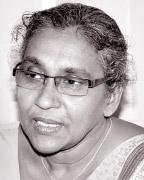Health Watch
June is National Nutrition Week:
WE ARE WHAT WE EAT
Senali S.Perera
The ministry of health has decided to name the month of June as the
National Nutrition Month to promote better nutrition among Sri Lankans.
Though we hear about nutrition around the clock, how many of us have
actually thought of making a change? It seems simple enough to turn the
thought in to action, but is it really? To explore answers, to seek
guidance, Daily News spoke to Dr. Shantha Gunawardana, acting Director
of the Nutrition Co-ordination Division.
|

Dr. Shantha Gunawardana. Picture by Saman Sri Wedage |
According to Dr. Gunawardana, Sri Lanka is in a good position when
compared with the health status indicators of South East Asia. But when
considering the nutritional indicators, it seems we cannot be satisfied
with our nutritional status.
“Nutrition is important throughout the life cycle,” says Dr.
Gunawardana. “Therefore, annually, we specially concern different
aspects. We try to create awareness among people about the importance of
nutrition under different themes.”
“Healthy Nation through Proper Nutrition” has been confirmed as the
theme for this year, 2013. “There are many avenues for the people to
gain knowledge, but the problem is most of us don’t practice it
properly,” says Dr. Gunawardana. “Although we know that people are
knowledgeable, do they give priority to nutrition?” This is the simple
truth. We learn about it, we hear about it and we know about it. But how
many of us have realized the importance of nutrition in one’s life? How
many of us are willing to change?
Responsibility
Creating awareness and making changes is not confined to this month
solely, points out Dr. Gunawardana. Nutrition is not the responsibility
of the Health Sector alone. “It’s a responsibility of everybody. We need
the help of government stake holders as well as non-governmental
agencies. We want to empower people from central level, provincial,
district and divisional levels as well.”
 The main objective of the National Nutrition Policy, according to Dr.
Gunawardana, is to ensure nutrition throughout one’s life cycle. And
also, to enhance the capacity to improve the nutritional status of the
population. “We also consider about the vulnerable population,” says Dr.
Gunawardana. The main objective of the National Nutrition Policy, according to Dr.
Gunawardana, is to ensure nutrition throughout one’s life cycle. And
also, to enhance the capacity to improve the nutritional status of the
population. “We also consider about the vulnerable population,” says Dr.
Gunawardana.
That is, underserved areas, plantation community, urban poor and war
affected areas etc. And also, to ensure the nutrition security for all
citizens. “In order to meet these objectives, we have to work with other
ministries. Agriculture, education, economic development, industries and
the media etc.,” she explains. “To implement the National Nutrition
Policy, we need a multi sectoral approach.”
The National Nutrition council was established in 2011 by President
Mahinda Rajapaksa, as proposed by the Minister of Health Maithreepala
Sirisena. After it was established two pilot projects were carried out
in Nuwara Eliya and Monaragala, according to Dr. Gunawardana.
“There we went from central level to provincial level. We got the
advocacy on nutritional improvement programs with the Chief Ministers of
the province and the provincial government and non-governmental
organizations,” says Dr. Gunawardana.
 Nuwara Eliya, Monaragala, Trincomalee, Batticaloa and Badulla are
nutritionally undeveloped districts. “It is important that we pay
special attention to these districts while programs are carried out in
the other areas as well,” says Dr. Gunawardana. Nuwara Eliya, Monaragala, Trincomalee, Batticaloa and Badulla are
nutritionally undeveloped districts. “It is important that we pay
special attention to these districts while programs are carried out in
the other areas as well,” says Dr. Gunawardana.
“We have found who needs our special attention. According to certain
indicators we have identified these families.” The causes of their
malnourishment are observed and are attended to.
National Nutrition Secretariat has been established in the President
Secretariat. “Using all these experiences, they are now formulating a
National Multi-sectoral Nutrition Action Plan,” says Dr. Gunawardana.
“Nourish Nation by 2016” is the theme of the plan. “The plan is
almost completed,” she says. “During this month, we might launch it. We
work together with the other ministries and all come together to take
part in this plan.”
Tips to fight obesity
Overweight and obesity are defined as abnormal or excessive fat
accumulation that may impair health. According to Dr. Gunawardana
over-nutrition happens when you take access amounts of certain foods
such as starch, sugar and oil. Obesity can be observed in 2% of
children. And in urban areas, the percentage rises up to 8%.
According to World Health Organization,
* a BMI (Body Mass Index) greater than or equal to 25 is overweight.
* a BMI (Body Mass Index) greater than or equal to 30 is obesity.
 BMI: It is defined as a person’s weight in kilograms divided by the
square of his height in meters (kg/m2). BMI: It is defined as a person’s weight in kilograms divided by the
square of his height in meters (kg/m2).
“When one is overweight, the organs in his or her body have to
over-work,” says Dr. Gunawardana. It is not a good thing in the long
run. “In over-nutrition, the body is under stress. Hormonal balance and
other functions are affected by this.”
The cholesterol levels go up and your blood vessels get thicker. And
also, the elasticity of the blood vessels will be reduced. And then they
become hypertensive. This leads to strokes and heart attacks.
“With high cholesterol levels, there are tendencies that one might
get cancers. (Breast cancer, bowel cancer etc.),” explains Dr.
Gunawardana. “People’s life styles have changed. They are more prone to
get refined foods. These foods cause malfunction in the bowels and leads
to increased blood sugar and cancer. Therefore, it is important to think
about your wellbeing and be concerned about what you consume.”
You have to be careful when choosing your drinks, too. Consuming too
much frizzy drinks with too much sugar leads you to increased blood
sugar and obesity. So it is important to be careful with your eating
habits before it is too late.
According the WHO:
The fundamental cause of obesity and overweight is an energy
imbalance between calories consumed and calories expended. Globally,
there has been:
* an increased intake of energy-dense foods that are high in fat; and
* an increase in physical inactivity due to the increasingly
sedentary nature of many forms of work, changing modes of
transportation, and increasing urbanization.
How can overweight and obesity be reduced?
* limit energy intake from total fats and sugars;
* increase consumption of fruit and vegetables, as well as legumes,
whole grains and nuts;
* Engage in regular physical activity (60 minutes a day for children
and 150 minutes per week for adults).
 “To practise healthy food habits among school children, we have taken
steps to introduce healthy food at their school canteens,” says Dr.
Gunawardana. “We have introduced what food should be available freely,
what foods should be available in moderate amounts and then in
restricted amounts, and some food are not to be displayed in school
canteens at all. The Health and Education ministries work together in
this.” “To practise healthy food habits among school children, we have taken
steps to introduce healthy food at their school canteens,” says Dr.
Gunawardana. “We have introduced what food should be available freely,
what foods should be available in moderate amounts and then in
restricted amounts, and some food are not to be displayed in school
canteens at all. The Health and Education ministries work together in
this.”
It is always recommended to eat home-prepared food. “If you pay at
least an hour in the Kitchen, the mothers can make a healthy meal for
the family,” says Dr. Gunawardana. “It not only improves health, but
also it improves the family bonds.”
But most mothers today have busy schedules. They simply can’t seem to
find enough time to spend in the kitchen. Buying fast food has become a
fast and easy way to deal with the family food problem. The kids love
it, problem solved. But is this right? Is this wise? Why not think of a
way to make something that your family will love and at the same time
would serve to improve your health? Dr. Gunawardana speaks to mothers:
“Firstly we must know what to eat and how to eat it,” says Dr.
Gunawardana. Half of your plate -that is, 50%- should be filled with
energy giving foods such as rice, cereal, and starch-food. The rest
should include vegetables including green vegetables. And you need 6 to
8 glasses of water per day.
“A balanced diet, the right amount of water and exercise are
important to lead a healthy life” says Dr. Gunawardana. Eating healthy
doesn’t have to be boring. Be creative. Hunt for a few recipes -ask from
a friend, surf the internet or buy a small booklet- and find out what
you can prepare within a few minutes. Make it interesting. Enjoy your
food in your body as well as in your mind. You can make a delicious,
healthy diet at a low cost, indulge in it.
“Exercising is also important,” says Dr. Gunawardana. “It helps not
only your body but also your mind. Mothers should make sure that their
children are allowed to play at least 1-2 hours a day. And an adults
need exercises 150 minutes per week,” she says.
It’s not too late to start your new life style. A better, healthier,
happier life style. Eat right and do your exercises. It’s the National
Nutrition Month, always a good standpoint to start over.
THE ‘DRIVE’ DOCTOR IS SPECIAL
Dr. Uthpala Malawara Arachchi, (MBBS, Msc in Medical
Administration, Diploma in Occupational Health and Safety)
Driving is a complex task. It requires many physical, mental, social
and educational abilities. Medical fitness to drive is an essential
component in transport safety. It is also the basic requirement for the
issue of license for driving. Assessment for medical fitness for driving
is in the hands of the doctor and the other related health workers.
There are three types of medical evaluations namely licensing, periodic
and post incidental. Pre licensing medical assessment is the first
medical examination that determines the client’s medical fitness to
drive.
Health of a person can deteriorate at any point of time. Periodic
medical examinations are required to spot any negative deviations in
one’s health that can affect driving. Post incidental medical
examinations are required for two reasons. First is to find any medical
cause involved in the accident whereas the second is for legal purposes.
 Although most of the western countries adopt a system where general
practitioner (family doctor), hospital doctor, optometrist or
occupational therapist has to inform the Driver Licensing Authority if
there is any illness of the applicant that may deprive him of driving,
in Sri Lanka we are having an independent evaluation system to assess
drivers for medical fitness. Although most of the western countries adopt a system where general
practitioner (family doctor), hospital doctor, optometrist or
occupational therapist has to inform the Driver Licensing Authority if
there is any illness of the applicant that may deprive him of driving,
in Sri Lanka we are having an independent evaluation system to assess
drivers for medical fitness.
Ineffective
Why is the general practitioner (Family Doctor) based system not
effective? Assessment of fitness for driving is a new discipline in the
medicine which is not included thoroughly in the medical curriculums.
Most of the General practising centers do not have proper examining
facilities to evaluate medical fitness.
In Sri Lanka almost all the family practitioners are privately based.
So, if the client is unfit to drive, the doctor is in a dilemma whether
to issue the medical certificate or lose the client by refusing to
issue.
History
At the beginning, assessment of medical fitness for driving was
mainly done by General Practitioners (Family doctors). In 1986 Central
Transport Board medical center started a program to assess the
applicants who had applied for the heavy vehicle driving license.
It made compulsory for all heavy vehicle drivers who had obtained
driving licenses after 1986, to undergo a medical examination at the CTB
medical centre. These assessment were done in every three years for
drivers who wanted to renew their heavy vehicle licenses.
Based on a concept of Dr Gamini Karunanayaka, CTB medical center was
renamed as National Transport Medical Institute (NTMI) by a parliament
act in 1997. He was the founder and the first Chairman of the NTMI.
In 2009 NTMI introduced medical certificates with security features.
This helped to prevent forge duplication of medical certificates mainly
for the heavy vehicle driver’s category.
In 2010 the institute started registering doctors who are evaluating
fitness for driving but this was not compulsory. This was made
compulsory and cancellation of older format of medical certificate
(white form) done in the 2012 September.
In March 2013 Minister of Transport Kumara Welgama has taken a
revolutionary step for the improvement of the medical assessment system.
That is to do all the medical assessments thereafter by the National
Transport Medical Institute.
Benefits
There will be less unhealthy drivers on the road causing road traffic
accidents, as there is a high standard screening system. This will
ensure several aspects of road safety.
*Clients have an opportunity to undergo quality medical examination
at a reasonable fee.
*Provision of regularly updating medical standards for fitness for
driving and medical rules.
*There is no conflict of interest and no breakage of doctor-patient
relationship as in the private sector.
*Opening up of new academic and professional avenues for transport
medical sector to develop towards international grades.
In the past decade lot of road traffic accidents due to health
related causes had been reported from the mass media.
Later it was revealed that most of them had not undergone a proper
medical examination but managed to get forged medical certificate from
the private sector.
Above mentioned political decision will save the considerable portion
of resources that will have to spend on the victims of the road traffic
accidents.
It will save lives of innocent travellers and road users, and finally
it will vastly influence the development of safe transport system in Sri
Lanka.
Ginsomin to beat stress
Constant stress and lack of energy are part and parcel of the modern
lifestyle of having it all – an education, a career, a family, and of
course leisure. In order to make living life to the fullest a reality
for Sri Lankan men, Mega Lifesciences introduced Ginsomin.
Containing authentic Korean Panax Ginseng extract, which is
standardized in Switzerland and subjected to a specialised
decontamination process using patented flachman technology, and a whole
host of essential vitamins and minerals to both relieve stress and
rejuvenate, Ginsomin is the perfect solution for the man on the go.
“Ginsomin enables men, restoring their energy and giving them the
ability to cope with different types and levels of stress. Whatever walk
of life they come from, whether it is a student facing a crucial exam,
the nervous new bridegroom, a careerist fighting his way up the
corporate ladder or a man of any age hoping to boost his fitness,
Ginsomin will help them unleash their potential. One capsule after
breakfast and you can get more done at both work and home, build better
relationships with colleagues and family, and essentially lead a healthy
and happy life,” said Lalith Dias, Brand Manager, Ginsomin.
Ginseng is a medicinal plant that has been known to humans for over
4,000 years and has been used in traditional Chinese, Korean and
Japanese medicine. Much research has been carried out during the past
three decades on its medicinal effects.
Panax Ginseng, not to be confused with the other varieties of
Ginseng, contains Ginsenosides which have multiple salutary effects.
Found exclusively in Panax Ginseng, Ginsenosides act as a stress buffer,
inhibiting the debilitating effects of stress and leaving you calm and
collected under pressure.
They also act as stimulants, improving physical capacity, alertness,
concentration, vitality, potency and libido.
Ginsomin also contains a wide range of vitamins and minerals
essential for a healthy body and mind. These include Beta-carotene, the
naturally occurring form of Vitamin A, which enhances cell growth and
reverses aging while natural vitamin E protects against cell damage and
is two times more effective than the synthetic version.
Vitamin C repairs tissue and improves adrenal gland functions while
Selenium which is a well recognized antioxidant protects against disease
and inhibits aging, and boosts the immune system. Most recently,
Ginsomin has been proven to hasten recovery from common illnesses such
as the common cold and the flu and is ideal for those prone to catching
general illnesses.
Mega Lifesciences Country Manager Praveen Viswakumaran said “Mega
Lifesciences is committed to providing quality products to consumers. At
Mega, we care, which is why we innovate products like Ginsomin so we can
make people’s lives better.
Ginsomin was the first Ginseng product to enter the Sri Lankan market
and is the only stress and fatigue reliever of this kind available here.
It also has a large international presence. Every day is a race and
Ginsomin helps you run that extra mile.”
Established in 1983, Mega Lifesciences is a leading pharmaceutical
company with a presence in 25 countries. It has production facilities in
Thailand and Australia, which are accredited by the European Union,
Australian and Thai Food and Drug Administrations. |





